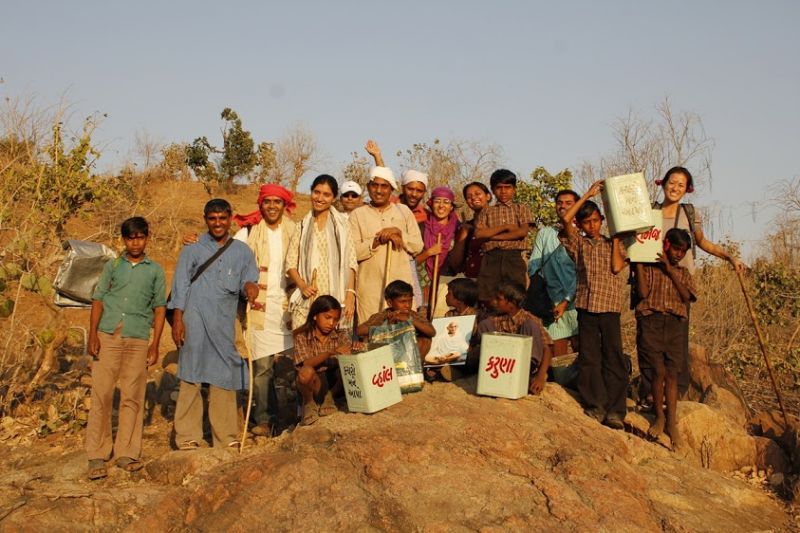
In the 2nd week of March 2013 just after the Moved By Love co-ordinators retreat, 11 of us of diverse ages and backgrounds decided to walk for a few days through some of the more isolated parts of the country –a tribal community on the border of Gujarat and Rajasthan.
A brief 3 hour drive and a visit to the LokNiketan Trust later, we left our cars behind at the closest motorable village – that of Ghoda. We then began our walk away from ‘civilization’. The intention was to walk for a couple of hours across hilly terrain, into a village called Khadichitra. Just a few kilometres into our journey, and we could see time racing back exponentially.
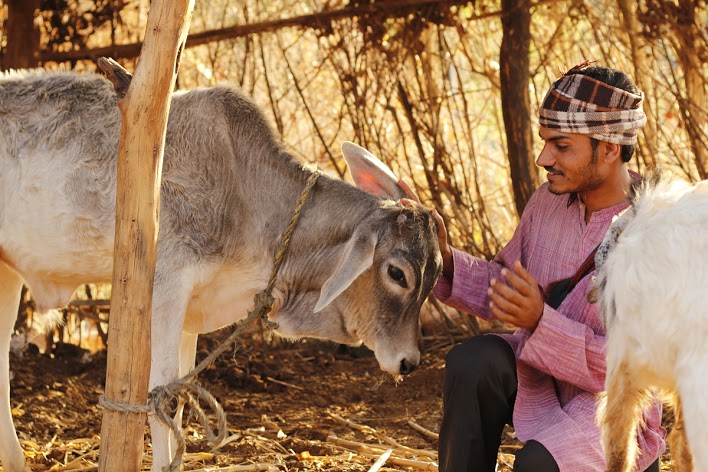 It was a land that seemed to be characteristic of life hundreds of years ago – clean, flowing streams, fields of local grains and vegetables grown for sustenance. Along the way, we were offered countless ‘chai’s and conversations within the cool houses made of mud, cow dung and straw. We learnt that theirs was a culture that had lived off the land, and in connection with one another for hundreds of years. With no roads or electricity – there was virtually no transactions with the outside world. The nearest ‘store’ was a few hours walk away. Their self-reliance led them to create their own social and family structures. All village disputes were resolved on their own through periodic discussions, without reliance on the law of any sort. There seemed to be an abundance in their perceived scarcity.
It was a land that seemed to be characteristic of life hundreds of years ago – clean, flowing streams, fields of local grains and vegetables grown for sustenance. Along the way, we were offered countless ‘chai’s and conversations within the cool houses made of mud, cow dung and straw. We learnt that theirs was a culture that had lived off the land, and in connection with one another for hundreds of years. With no roads or electricity – there was virtually no transactions with the outside world. The nearest ‘store’ was a few hours walk away. Their self-reliance led them to create their own social and family structures. All village disputes were resolved on their own through periodic discussions, without reliance on the law of any sort. There seemed to be an abundance in their perceived scarcity.
No doubt, an unstructured walk of this kind is bound to evoke a certain romanticism about the generosity of a community so separated from the outside materialistic world. But simultaneously, I could feel my ‘development’ oriented mind screaming. I could see my mind noticing all the apparent flaws, or what needed to be fixed.
We met a man who had 22 children and three wives!; boys suffered from hygiene issues since they wore only pair of clothes until they tore away. After 60 years of independence and this village was still plunged in absolute darkness at night. There was rampant deforestation all around. Medical aid was nowhere near in sight, and water still had to be drawn from open wells that were susceptible to pollution.
But just a few hours into the walk, I find myself enveloped by a stillness that pervaded the woods. Over each conversation with children and locals, I found a story beyond the flaws.
The lack of electricity meant they didn’t have television sets screaming and pointing out their material poverty. A lack of irrigation meant they used age old techniques of furrows and rocks to divert water into their farms. The lack of roads meant there were no ‘Gutka’ pouches and ‘Chips’ packets strewn across the landscape.
How do we balance the romantic notions of generosity in a community like this, with the development issues? I seemed to be succumbing to all these thoughts, when we met Mustukhan, a 26 year old from the city of Bhavnagar. 8 months ago, took a leap of faith and arrived here after having worked with untouchables through a large Gandhian organization for two years.
He had come here without knowing anyone, or the local language – only a simple intention of surrendering and serving a community. Initially, he walked from home to home, and through broken words and sentences he would listen, and hold the tribals stories and paradoxes. It wasn’t about fixing, but offering oneself as their servant.
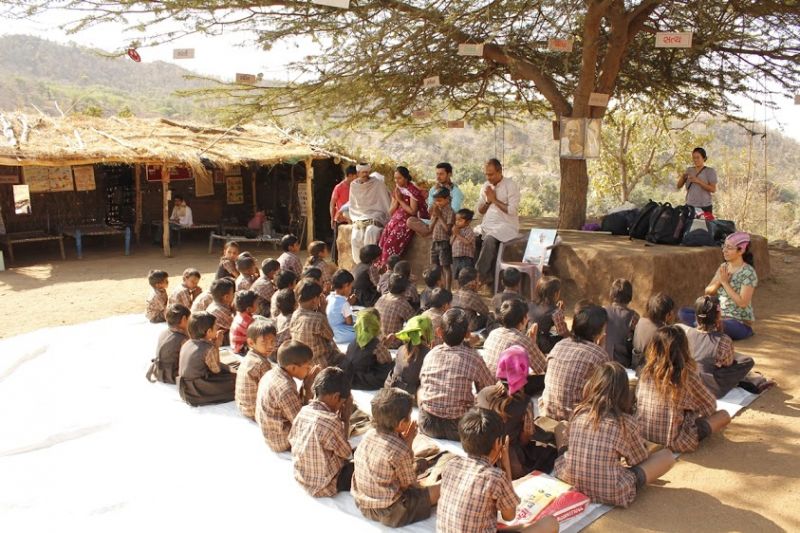 Over dinners and meals together, he would cut children’s nails with the nail-cutter that he found attached to his keychain. On the next visit, he brought some skin lotion from the nearest store since he saw skin lesions on a majority of the community.
Over dinners and meals together, he would cut children’s nails with the nail-cutter that he found attached to his keychain. On the next visit, he brought some skin lotion from the nearest store since he saw skin lesions on a majority of the community.
The first couple of nights, he was offered a goat shed to stay in. A week later, the community’s elder -Asha Kaka offered him some barren land to build a home. A home that was built with the villagers using straw and mud plaster. The next day after the home was built; he had children flocking towards the structure out of curiosity. They looked at the makeshift mirror in his verandah and immediately started running a comb through their hair (probably the first time in weeks).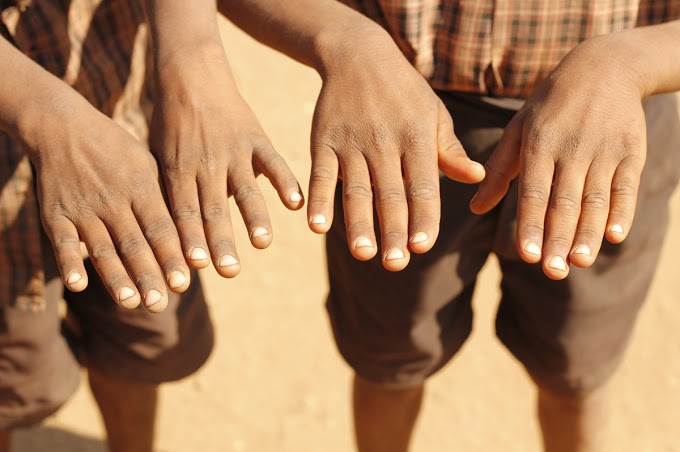 Slowly, he began teaching them little messages about personal hygiene. Over the next few weeks, more kids came by and soon he had to structure a schedule for the children – much like a school. Infact – he decided to christen the space – ‘Ghar-shaala’ (Home-school) – run under the shade of a beautiful tree that was adorned with words
Slowly, he began teaching them little messages about personal hygiene. Over the next few weeks, more kids came by and soon he had to structure a schedule for the children – much like a school. Infact – he decided to christen the space – ‘Ghar-shaala’ (Home-school) – run under the shade of a beautiful tree that was adorned with words
During Diwali, he intended to head back to his home town of Bhavnagar as usual, but he decided to spend the festival with his new family “This is where my home is now” and as a result, he cooked and hosted the residents of his community for a large dinner.
“Most of the residents have seen Government officials and NGO workers pass through in the past. But when I received the opportunity to cook and serve dinner at Diwali, they realized this was different.” They connected with me in a very different way because I didn’t represent any organization or Government. They connected with me in a way that they have been used to – through trust.
Months of service later, and he was starting to see people responding and opening up to him. On his walks through the community he was repeatedly called ‘Sir’ but after much persuasion, they agree to call him ‘Mota Bhai’ or brother. ‘If you call me Sir I’ll forget to keep learning from all of you!’
And that was the essence of Mustubhai’s work. He really just served to one day be one with those around him. To learn their language, to wear their clothes, to honour their context and their complexities.
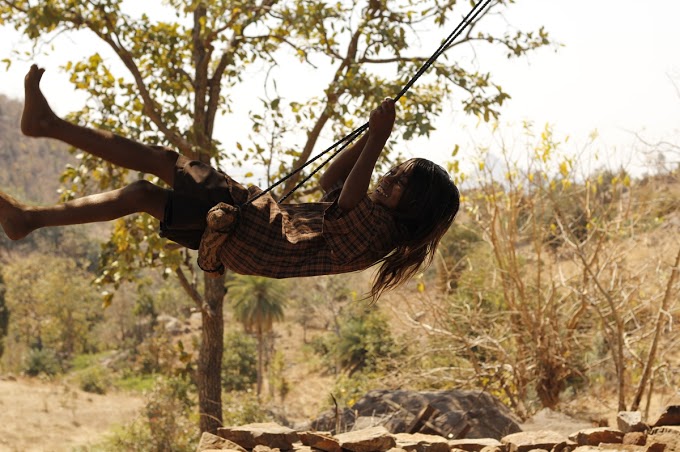 Has it been difficult – living here all alone in this alien land? We asked. “Yes – but that’s what this journey is about – navigating and exploring our boundaries. Service, is like a divine flow – each bend in the course offers us an opportunity to adapt and learn” One night, due to unseasonal rains, the roof of his house blew off with a gust of wind. With a few kids who chose to spend the night at home, Mustu decided to celebrate the situation by singing a song about the rains. The kids followed, and the moment was transformed into a beautiful opportunity to build deeper ties.
Has it been difficult – living here all alone in this alien land? We asked. “Yes – but that’s what this journey is about – navigating and exploring our boundaries. Service, is like a divine flow – each bend in the course offers us an opportunity to adapt and learn” One night, due to unseasonal rains, the roof of his house blew off with a gust of wind. With a few kids who chose to spend the night at home, Mustu decided to celebrate the situation by singing a song about the rains. The kids followed, and the moment was transformed into a beautiful opportunity to build deeper ties.
As the number of children increased, he decided to engage them in more activites in his home-school. “It would be great to have a cow someday – we can all take turns taking her out to graze, use her milk for the school. Learn from serving even the animals”
Our country’s diverse culture and contexts is something we don’t need to be reminded of time and again – but it’s worth noting how we often resort to homogenous solutions for complex situations.
That night, we all laid our heads on a cot hand made by the very man who had 3 wives and all those children. My quickfix solution would have been to create structures and family planning programs that reprimand such behaviour. But having seen him at work for the last few hours, you got a sense of the devotion that he held towards his work, how he was constantly toiling to create better offerings for his community.
As I laid my head to rest on the cot that he had made just that day, I could see the countless stars in the sky. The black background didn’t seem to be all that 2 dimensional anymore. There was this added dimension that we could see since there were absolutely no street lights or electricity. It was a dimension of complexity that we could respect only if we had stillness in our minds. A stillness to look at situations and say – how can I serve, and not fix. A stillness that allows us to serve from a harmony of our heart, head and hand that created an impact more sustainable than intellectual solutions.
Sure, LED lights, solar panels, roads, medical facilities would be great. Social Enterprise, Non-profits and Government Policies would be ideal for implementing all of these – but it was critical to keep an eye on the externalities that they bring along with them. To maintain the social structure and trust within this community that ensured most of them seemed happier than us.
Late into the night, you could hear drum beats - part of a ritual that might signal superstitions were ripe. But something told me we must trust that this approach had something interesting to offer. We must understand that solutions cannot be imposed, but emerge collectively when we become one with our community – just like Mota-bhai who dissolves within the collective.
~ Service is a Divine Flow indeed ~
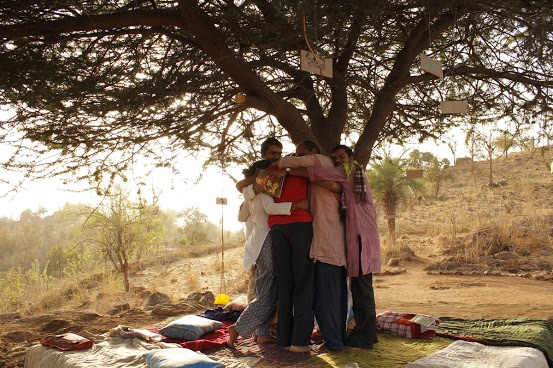
View the complete gallery of pictures here.

In the 2nd week of March 2013 just after the Moved By Love co-ordinators retreat, 11 of us of diverse ages and backgrounds decided to walk for a few days through some of the more isolated parts of the country –a tribal community on the border of Gujarat and Rajasthan.
A brief 3 hour drive and a visit to the LokNiketan Trust later, we left our cars behind at the closest motorable village – that of Ghoda. We then began our walk away from ‘civilization’. The intention was to walk for a couple of hours across hilly terrain, into a village called Khadichitra. Just a few kilometres into our journey, and we could see time racing back exponentially.
 It was a land that seemed to be characteristic of life hundreds of years ago – clean, flowing streams, fields of local grains and vegetables grown for sustenance. Along the way, we were offered countless ‘chai’s and conversations within the cool houses made of mud, cow dung and straw. We learnt that theirs was a culture that had lived off the land, and in connection with one another for hundreds of years. With no roads or electricity – there was virtually no transactions with the outside world. The nearest ‘store’ was a few hours walk away. Their self-reliance led them to create their own social and family structures. All village disputes were resolved on their own through periodic discussions, without reliance on the law of any sort. There seemed to be an abundance in their perceived scarcity.
It was a land that seemed to be characteristic of life hundreds of years ago – clean, flowing streams, fields of local grains and vegetables grown for sustenance. Along the way, we were offered countless ‘chai’s and conversations within the cool houses made of mud, cow dung and straw. We learnt that theirs was a culture that had lived off the land, and in connection with one another for hundreds of years. With no roads or electricity – there was virtually no transactions with the outside world. The nearest ‘store’ was a few hours walk away. Their self-reliance led them to create their own social and family structures. All village disputes were resolved on their own through periodic discussions, without reliance on the law of any sort. There seemed to be an abundance in their perceived scarcity.No doubt, an unstructured walk of this kind is bound to evoke a certain romanticism about the generosity of a community so separated from the outside materialistic world. But simultaneously, I could feel my ‘development’ oriented mind screaming. I could see my mind noticing all the apparent flaws, or what needed to be fixed.
We met a man who had 22 children and three wives!; boys suffered from hygiene issues since they wore only pair of clothes until they tore away. After 60 years of independence and this village was still plunged in absolute darkness at night. There was rampant deforestation all around. Medical aid was nowhere near in sight, and water still had to be drawn from open wells that were susceptible to pollution.
But just a few hours into the walk, I find myself enveloped by a stillness that pervaded the woods. Over each conversation with children and locals, I found a story beyond the flaws.
The lack of electricity meant they didn’t have television sets screaming and pointing out their material poverty. A lack of irrigation meant they used age old techniques of furrows and rocks to divert water into their farms. The lack of roads meant there were no ‘Gutka’ pouches and ‘Chips’ packets strewn across the landscape.
How do we balance the romantic notions of generosity in a community like this, with the development issues? I seemed to be succumbing to all these thoughts, when we met Mustukhan, a 26 year old from the city of Bhavnagar. 8 months ago, took a leap of faith and arrived here after having worked with untouchables through a large Gandhian organization for two years.
He had come here without knowing anyone, or the local language – only a simple intention of surrendering and serving a community. Initially, he walked from home to home, and through broken words and sentences he would listen, and hold the tribals stories and paradoxes. It wasn’t about fixing, but offering oneself as their servant.
 Over dinners and meals together, he would cut children’s nails with the nail-cutter that he found attached to his keychain. On the next visit, he brought some skin lotion from the nearest store since he saw skin lesions on a majority of the community.
Over dinners and meals together, he would cut children’s nails with the nail-cutter that he found attached to his keychain. On the next visit, he brought some skin lotion from the nearest store since he saw skin lesions on a majority of the community.The first couple of nights, he was offered a goat shed to stay in. A week later, the community’s elder -Asha Kaka offered him some barren land to build a home. A home that was built with the villagers using straw and mud plaster. The next day after the home was built; he had children flocking towards the structure out of curiosity. They looked at the makeshift mirror in his verandah and immediately started running a comb through their hair (probably the first time in weeks).
 Slowly, he began teaching them little messages about personal hygiene. Over the next few weeks, more kids came by and soon he had to structure a schedule for the children – much like a school. Infact – he decided to christen the space – ‘Ghar-shaala’ (Home-school) – run under the shade of a beautiful tree that was adorned with words
Slowly, he began teaching them little messages about personal hygiene. Over the next few weeks, more kids came by and soon he had to structure a schedule for the children – much like a school. Infact – he decided to christen the space – ‘Ghar-shaala’ (Home-school) – run under the shade of a beautiful tree that was adorned with wordsDuring Diwali, he intended to head back to his home town of Bhavnagar as usual, but he decided to spend the festival with his new family “This is where my home is now” and as a result, he cooked and hosted the residents of his community for a large dinner.
“Most of the residents have seen Government officials and NGO workers pass through in the past. But when I received the opportunity to cook and serve dinner at Diwali, they realized this was different.” They connected with me in a very different way because I didn’t represent any organization or Government. They connected with me in a way that they have been used to – through trust.
Months of service later, and he was starting to see people responding and opening up to him. On his walks through the community he was repeatedly called ‘Sir’ but after much persuasion, they agree to call him ‘Mota Bhai’ or brother. ‘If you call me Sir I’ll forget to keep learning from all of you!’
And that was the essence of Mustubhai’s work. He really just served to one day be one with those around him. To learn their language, to wear their clothes, to honour their context and their complexities.
 Has it been difficult – living here all alone in this alien land? We asked. “Yes – but that’s what this journey is about – navigating and exploring our boundaries. Service, is like a divine flow – each bend in the course offers us an opportunity to adapt and learn” One night, due to unseasonal rains, the roof of his house blew off with a gust of wind. With a few kids who chose to spend the night at home, Mustu decided to celebrate the situation by singing a song about the rains. The kids followed, and the moment was transformed into a beautiful opportunity to build deeper ties.
Has it been difficult – living here all alone in this alien land? We asked. “Yes – but that’s what this journey is about – navigating and exploring our boundaries. Service, is like a divine flow – each bend in the course offers us an opportunity to adapt and learn” One night, due to unseasonal rains, the roof of his house blew off with a gust of wind. With a few kids who chose to spend the night at home, Mustu decided to celebrate the situation by singing a song about the rains. The kids followed, and the moment was transformed into a beautiful opportunity to build deeper ties.As the number of children increased, he decided to engage them in more activites in his home-school. “It would be great to have a cow someday – we can all take turns taking her out to graze, use her milk for the school. Learn from serving even the animals”
Our country’s diverse culture and contexts is something we don’t need to be reminded of time and again – but it’s worth noting how we often resort to homogenous solutions for complex situations.
That night, we all laid our heads on a cot hand made by the very man who had 3 wives and all those children. My quickfix solution would have been to create structures and family planning programs that reprimand such behaviour. But having seen him at work for the last few hours, you got a sense of the devotion that he held towards his work, how he was constantly toiling to create better offerings for his community.
As I laid my head to rest on the cot that he had made just that day, I could see the countless stars in the sky. The black background didn’t seem to be all that 2 dimensional anymore. There was this added dimension that we could see since there were absolutely no street lights or electricity. It was a dimension of complexity that we could respect only if we had stillness in our minds. A stillness to look at situations and say – how can I serve, and not fix. A stillness that allows us to serve from a harmony of our heart, head and hand that created an impact more sustainable than intellectual solutions.
Sure, LED lights, solar panels, roads, medical facilities would be great. Social Enterprise, Non-profits and Government Policies would be ideal for implementing all of these – but it was critical to keep an eye on the externalities that they bring along with them. To maintain the social structure and trust within this community that ensured most of them seemed happier than us.
Late into the night, you could hear drum beats - part of a ritual that might signal superstitions were ripe. But something told me we must trust that this approach had something interesting to offer. We must understand that solutions cannot be imposed, but emerge collectively when we become one with our community – just like Mota-bhai who dissolves within the collective.
~ Service is a Divine Flow indeed ~

View the complete gallery of pictures here.

No comments:
Post a Comment